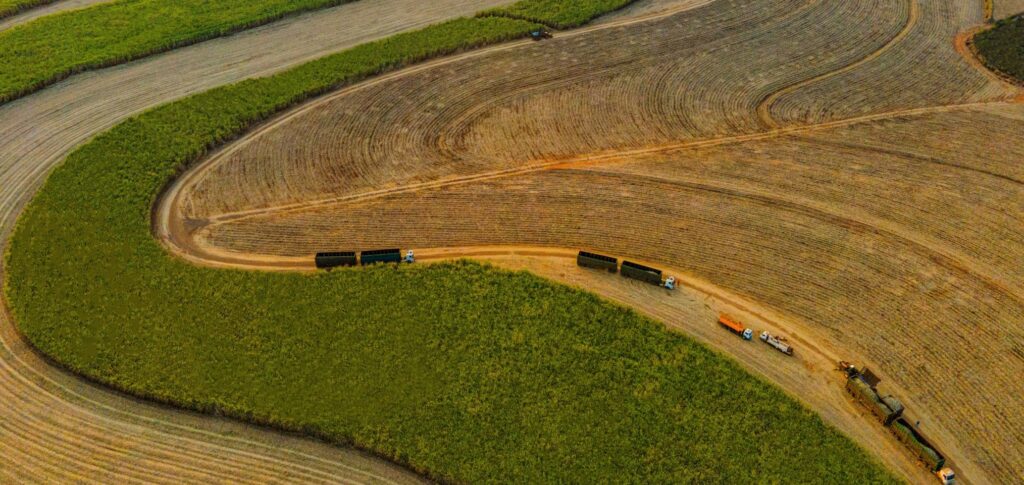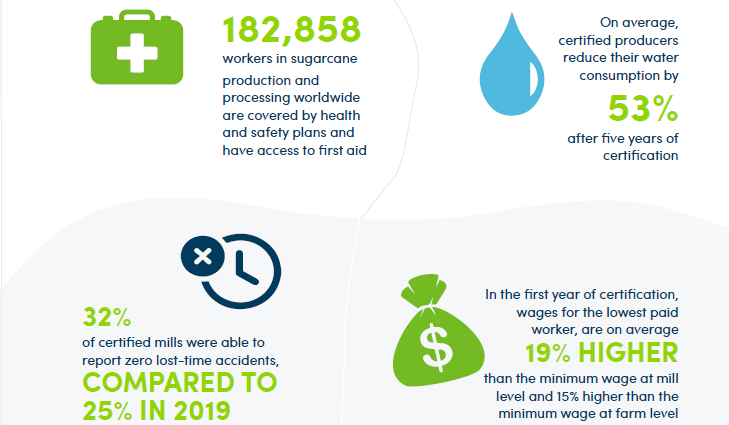17th October 2022

Our latest Outcome Report demonstrates that Bonsucro is growing at a steady pace. Analysis of certification data from the 2020-21 sugarcane harvests indicates that Bonsucro certification continues to lead to more environmentally friendly production practices, and safer working conditions.
Highlights from this year’s report show that:
- Certified producers reduce their CO2 equivalent emissions by an average of 18% over five years
- 71% of certified mills produce enough electricity from burning bagasse to export a portion to their national grid
- 32% of certified mills were able to report zero time lost due to accidents, up from 25% in the previous year
- Proper personal protective equipment was provided to more than 110,000 farm workers
- Water consumption reduced by 53% on average after five years of certification
The data shows that certification against the Production Standard creates safer working conditions on farms and at mills and reduces the environmental impact of sugarcane production. Certification against the Bonsucro Production Standard takes hard work and commitment, so the positive outcomes in the report are because of our members’ dedication.

Membership
In 2021, we welcomed members from new countries including Jamaica, Martinique, and Bosnia and Herzegovina. In addition, the membership retention rate in the 2020-21 financial year was 93%. Through Bonsucro’s membership satisfaction survey, members reported an average satisfaction score of four out of five.
Membership growth outside of primary production, shows that biomaterials companies and rum producers account for the biggest proportion of our new members. This is in line with the trend to diversify the sugarcane value chain into newer markets. The products available from new members include packaging made from bagasse and hygiene products made from sugarcane fibres.
Environmental impact
The latest data shows that certification against the Production Standard continues to reduce the environmental impact of sugarcane and protect biodiversity. For example, no land under certification has been converted from high conservation value areas into farmland.
We ban the application of harmful chemicals in sugarcane production, which has protected 1,504,302 hectares of land. In addition, certified producers continue to see their greenhouse gas emissions and water use reduce the longer they are certified. This is in line with previous trends.
Social impact
People working on certified farms and mills continue to have safer and more reliable working conditions. The Production Standard’s core indicators mean that globally, 182,858 workers in sugarcane production and processing have proper contracts, occupational health and safety plans in place, and access to safe drinking water.
Our Production Standard also requires that the lowest earning staff are paid at least the national minimum wage. Our data shows that workers tend to be paid above the national minimums: in 2020 82% of Bonsucro certified farms paid their entry-level workers above the national minimum wage and 18% were paid at the national minimum.
Looking ahead
Our 2021-26 Strategic plan aims to reduce the environmental impact of sugarcane. As climate change is an urgent topic particularly relevant to the sugarcane sector, we are currently looking at how we deliver greenhouse gas emissions reporting e.g. learning from the EU RED II approach to land use change emissions. We understand this is something that our members will find useful and will offer them value. We anticipate that this work will be complete in 2023.
In line with our strategic plan, we will continue to offer our members access to useful resources and training on topics covered by our Production Standard.





